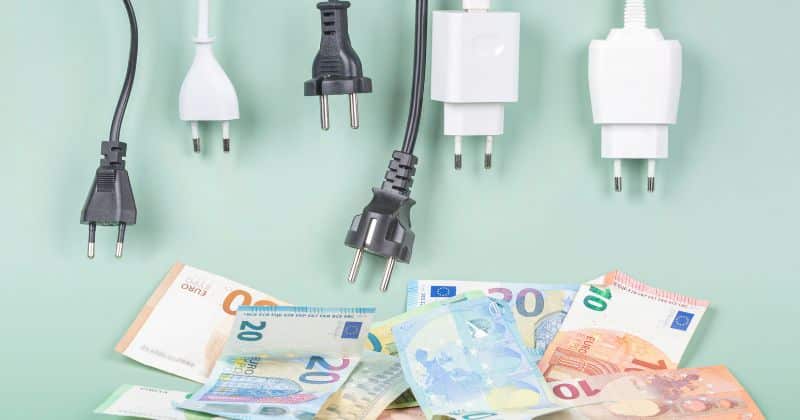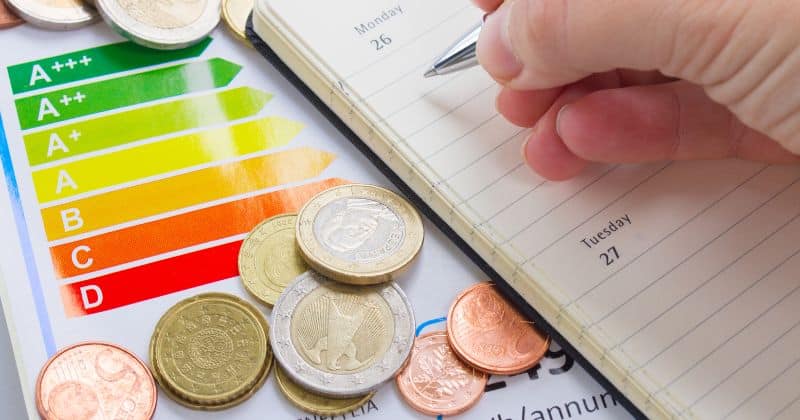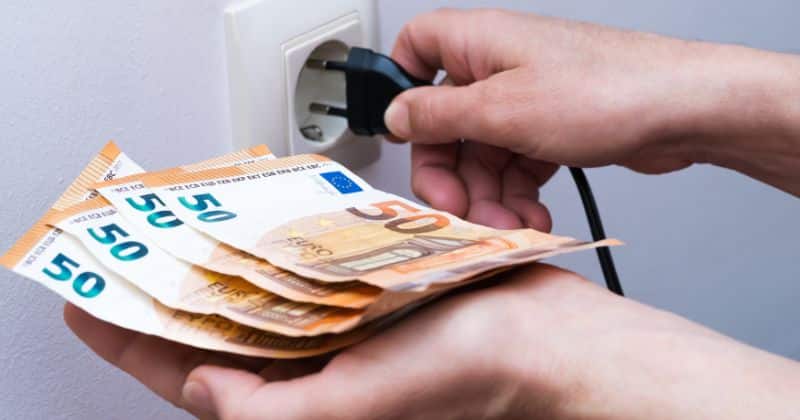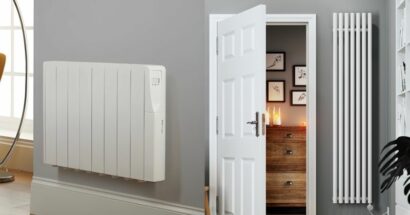Have you ever found yourself wrapped up in a blanket, your electric heater humming in the background, and wondered how much electricity does a heater use?
Or maybe you’ve been trying to calculate how long will 70p electric last with your heater on during those long, cold evenings. These thoughts are common, especially when we’re all looking for ways to keep our homes warm without breaking the bank.
Picture this: You have your hot chocolate, comfy socks, and trusty electric heater. But as you reach for the remote, a question pops into your head – do electric heaters use a lot of electricity? Suddenly, you’re not just thinking about staying warm; you’re also considering the efficiency and cost-effectiveness of your heating choice.
Electric heaters, known for their convenience and ease of use, are a go-to solution for many during the chillier months. But the burning question of how much electricity a heater uses is a significant concern, particularly for those keen on reducing our energy footprint and keeping our bills manageable.
This guide is tailored for homeowners, renters, energy-conscious consumers, and DIY enthusiasts. You’ll find valuable insights into the efficiency of electric heaters, learn about their impact on your electricity bills, and discover alternatives that could better fit your lifestyle and budget.
Keep reading to uncover the answers to these pressing questions and learn how to make informed decisions about heating your home efficiently and economically.
Understanding Electric Heater Energy Consumption
Electric heaters are key to keeping our homes warm, especially outside cold. They’re super handy because they heat a room fast. But have you ever thought about how much electricity an electric heater uses?
With energy prices increasing and everyone trying to be more eco-friendly, it’s really important to know about the energy use of these heaters.
There are different kinds of electric heaters, and each type has its way of using energy. Knowing about these types helps you pick the right one for your home to stay warm without using too much electricity. Let’s check out these types and see how they fit with what you need:
- Convection Heaters: These heaters warm up the air in a room, making them great for heating larger spaces evenly. They work by circulating hot air throughout the room.
- Radiant Heaters: Radiant heaters are ideal for heating people and objects directly before them; they are perfect for smaller spaces or personal use. They provide direct, focused warmth.
- Oil-Filled Heaters: These heaters are filled with oil heated by an electric element. They are good for maintaining consistent heat over a longer period, making them suitable for larger rooms.
- Ceramic Heaters: Known for their safety and efficiency, ceramic heaters are typically compact and use a ceramic heating element. They’re great for heating small to medium-sized rooms.
- Infrared Heaters: These heaters emit infrared rays that directly warm up objects and people in the room. They are efficient for spot heating in smaller or specific areas.
- Panel Heaters: Slim and sleek, panel heaters can be wall-mounted or freestanding. They are good for providing background heat and are suitable for both small and medium-sized rooms.
- Fan Heaters: Fan heaters blow air over a heated element to quickly warm a room. They are ideal for small spaces and short-term heating needs.
- Storage Heaters: These heaters store thermal energy during the night (when electricity is often cheaper) and release the heat during the day. They are typically used in larger rooms.
Each indoor electric heater type has unique advantages and is suitable for different heating requirements, room sizes, and personal preferences.
Factors Influencing the Energy Consumption of Electric Heaters
When it comes to the energy consumption of electric heaters, several factors come into play. Understanding these can help you choose and use your heater more efficiently. Here’s a list of the key factors:
Wattage of the Heater
The wattage of an electric heater directly impacts its energy consumption. Higher-wattage heaters draw more power, leading to increased electricity use. This is crucial because it determines the heater’s ability to produce heat and, consequently, the cost of operation.
For instance, a high-wattage heater, such as a 3000W electric radiator, can heat a room quickly but will consume more electricity, making it ideal for larger spaces where rapid heating is essential. Understanding this balance between heating efficiency and energy costs is essential.
Duration of Use
The length of time a heater is used significantly affects energy consumption. Continuous or extended use leads to higher electricity usage, such as leaving lights on for longer, which increases the electricity bill.
Local Electricity Rates
Local electricity rates significantly impact the cost of using an electric heater. Higher rates in some areas mean that the same heater usage can cost more compared to regions with lower rates. It’s important to know these cost differences to manage heating expenses effectively.
For detailed information on electricity pricing across various regions, Ofgem’s publication on local electricity network price control for 2023-2028 provides valuable insights, helping users understand and plan for these regional cost variations.
Thermostat Settings
The settings on a heater’s thermostat are crucial in determining energy consumption. When the thermostat is set to a higher temperature, the heater uses more electricity to maintain that warmth. Managing these settings effectively can result in considerable energy savings without compromising comfort.
Room Insulation
The quality of a room’s insulation affects how well it retains heat, influencing the heater’s energy consumption. Well-insulated rooms require less energy to maintain a warm temperature, reducing the need for prolonged heater use.
Heater Efficiency
The efficiency of a heater is a key factor in determining its electricity consumption for producing a certain amount of heat. Heaters designed to be energy-efficient consume less electricity while delivering the same level of warmth, making them a more economical option in the long run.
Type of Heater
Different types of heaters, including convection, radiant, and oil-filled models, offer varying degrees of energy efficiency. Each type is designed to meet specific heating requirements and is better suited to certain environments.
Understanding how these types differ in energy consumption is important, as this knowledge is key to selecting the most appropriate heater for your specific needs. For a clear comparison of heater types and their efficiency, the guide on the different types of heating systems in the UK by Best Electric Radiators is a useful resource.
Room Size and Layout
The size and layout of a room significantly influence the energy required for effective heating. Larger areas or rooms with unique features like high ceilings require more powerful heaters, increasing energy consumption.
Choosing a heater that matches a room’s specific size and layout is crucial for efficient heating. Best Electric Radiators’ Electric Heater Size Guide is a helpful resource for guidance on selecting the right heater based on room dimensions.
Ambient Temperature
The ambient temperature outside plays a significant role in determining the energy usage of indoor heaters. Heaters must exert more energy in colder conditions to achieve and maintain a comfortable indoor temperature.
This increased demand for energy in lower ambient temperatures is important for those looking to use their heating systems efficiently.
Maintenance and Age of Heater
The condition and age of a heater can affect its energy efficiency. Older or poorly maintained heaters may not operate as efficiently, leading to higher energy use. Regular maintenance ensures heaters operate at peak efficiency, reducing unnecessary energy consumption.
How Much Electricity Does an Electric Heater Use?
Electric heaters are popular when heating your home, especially during the colder months. However, a common question arises: How much does it cost to run an electric heater?
The answer depends on several factors, including the heater’s wattage, the duration of use, and local electricity rates.
Let’s consider a typical scenario to understand the cost of running an electric heater.
Imagine a small room heater with a capacity of 1,500 watts, and you run it for 8 hours a day. To calculate the daily cost, consider the heater’s wattage and the cost per kilowatt-hour (kWh) in your area.
The formula to calculate the cost is:
Cost = Wattage of the heater × Hours of use1,000 × Cost per kWh
For example, if the cost per kWh is £0.15, the daily cost of running the heater for 8 hours would be:
Cost =1500 x 81000 x 0.15 = £1.80 per day
This formula can be applied to different scenarios, whether using a smaller heater for fewer hours or a larger one for more extended periods.
To provide a clearer picture, here’s a table representing the cost of running electric heaters of different capacities for various durations:
| Heater Capacity (Watts) | Daily (8 hrs) | Weekly (56 hrs) | Monthly (240 hrs) | Yearly (2,880 hrs) |
| 500 | £0.60 | £4.20 | £18.00 | £216.00 |
| 1,000 | £1.20 | £8.40 | £36.00 | £432.00 |
| 1,500 | £1.80 | £12.60 | £54.00 | £648.00 |
| 2,000 | £2.40 | £16.80 | £72.00 | £864.00 |
Always Remember: These figures are based on an average electricity rate of £0.15 per kWh. It’s important to note that the actual cost can vary depending on your local electricity rates and the specific usage of your heater.
Calculating Heating Time on a Budget: How Long Will 70p Electric Last?
Many wonder how long a small amount of money, like 70p, can power an electric heater. Let’s simplify this with an easy-to-follow example:
Step 1: Understand Your Electricity Rate
First, know your electricity rate. For this example, we’ll use the average rate of £0.15 per kilowatt-hour (kWh).
Step 2: Convert Your Budget to Kilowatt-Hours
- Calculate how much electricity you can get for 70p.
- Formula: Electricity in kWh = Amount in £ / Cost per kWh
- Calculation: 0.70 / 0.15 = 4.67 kWh
Step 3: Know Your Heater’s Power Ratings
- Identify the power rating of your electric heater, usually given in watts. We’ll use a common heater rating of 1,500 watts (or 1.5 kW) for this example.
Step 4: Calculate the Duration of Heating
- Determine how long you can run your heater with 4.67 kWh.
- Formula: Duration in hours = Electricity in kWh / Heater power in kW
- Calculation: 4.67 / 1.5 ≈ 3.11 hours
Step 5: Interpret the Result
- With a 1,500-watt heater, 70 watts of electricity will last approximately 3.11 hours.
Note: This is a general calculation. The time may vary based on your heater’s efficiency, room temperature, and specific electricity rates.
Electric Heater Pros and Cons
Electric heaters, ranging from compact portable units to larger models designed for spacious rooms, offer convenience and versatility. However, weighing their benefits against potential drawbacks is important, particularly when selecting the most suitable heating option for your home.
| Advantages of Electric Heaters | Disadvantages of Electric Heaters |
| Quick Heating: Immediate warmth for fast space heating. | High Electricity Consumption: Increased energy bills, especially for large room models. |
| Ease of Installation: Minimal setup, usually just a power outlet needed. | Limited Heating Area: More effective in small spaces, less so in larger areas. |
| Versatility: Suits diverse needs with various types like convection and radiant. | Dry Indoor Air: This can cause discomfort and health issues due to moisture depletion. |
| Safety Features: Often includes automatic shut-off and tip-over protection. | Environmental Concerns: Sustainability depends on the electricity source; it is not always eco-friendly. |
| Portability: Easy to move and provide heat where needed. | Maintenance Requirements: Some types need regular upkeep for safe and efficient operation. |
| Direct Room Heating: Efficiently heats the occupied space rather than the entire home. | Dependence on Electricity: Not reliable in areas with frequent power outages. |
| No Need for Ductwork: Eliminates the need for complex heating systems and duct installation. | Surface Heat Risks: Potential burn hazards due to hot surfaces, especially around children and pets. |
How To Run an Electric Heater More Efficiently?
Efficient use of an electric heater is not just about comfort but energy conservation and cost-effectiveness. Understanding how to operate your heater with maximum electric heater efficiency can significantly reduce your energy bills.
Whether you have a high-efficiency portable electric heater or a standard model, the right practices can make a big difference in warmth and energy usage.
5 Practical Tips on Using Electric Heaters
Maximising the efficiency of your electric heater is crucial for both comfort and energy savings. Here are five practical tips to enhance the performance and efficiency of your electric heaters:
Adjust Thermostat Settings Wisely
Properly setting your heater’s thermostat can lead to substantial energy savings. A slight decrease in temperature can improve electric heater efficiency without sacrificing comfort. This is especially true for high-efficiency electric wall heaters and the most efficient electric home heaters.
Seal Any Drafts
Preventing heat loss through drafts is essential for electric resistance heating efficiency. Sealing windows and doors ensure the warmth stays inside, making your heater’s job easier and more effective.
Regular Maintenance Is Key
Maintaining your electric heater, whether it’s the most cost-effective electric radiator or the most efficient small electric heater, is crucial. Regular cleaning and checks can prevent energy wastage and prolong the life of your heater.
Use Timers and Programmable Features
Modern electric heaters often have energy-saving features like timers and programmable settings. These can significantly reduce energy consumption, making them a key aspect of electric heater efficiency.
Choose the Right Heater for Your Space
Selecting a heater that’s appropriately sized for your room is vital for efficiency. The right size ensures optimal performance and energy usage, whether it’s the most efficient electric space heater or a larger model.
Are Portable Space Heaters More Expensive To Run?
Many wonder if portable space heaters are more expensive than other electric heaters when considering heating options. While portable heaters offer the convenience of mobility and focused heating, they can be costlier in terms of energy consumption, especially when used as the primary heat source in larger spaces.
Factors like room size, heater capacity, and usage duration significantly determine their cost-effectiveness. Additionally, the type of portable heater – whether it’s an infrared, ceramic, or oil-filled model – also impacts its energy consumption and suitability for different spaces.
To help you better understand the pros and cons of using portable space heaters, here’s a table that breaks down their key advantages and disadvantages:
| Pros of Portable Space Heaters | Cons of Portable Space Heaters |
| Mobility: Easy to move around to different rooms. | Higher Energy Bills: These can be costly if used extensively. |
| Direct Heating: Efficient in quickly warming up small, specific areas. | Limited Area Coverage: Not ideal for heating large spaces evenly. |
| No Installation Required: Ready to use without any complex setup. | Safety Concerns: Potential risk of fire if not used carefully. |
| Variety of Designs: Available in many styles to suit different preferences. | Dry Air: This can lead to dry indoor air, affecting comfort and health. |
| Adjustable Settings: Features like thermostats offer control over heat levels. | Noise Level: Some models can be noisy during operation. |
| Supplemental Heating: Great for boosting existing heating systems. | Energy Inefficiency: Not the most energy-efficient option for continuous use. |
| Immediate Warmth: Provides quick heat without waiting for a room to warm up. | Maintenance: Requires regular cleaning and checks for safe operation. |
| Cost-Effective for Short Use: Economical for brief and targeted heating. | Environmental Impact: Higher electricity use can contribute to a larger carbon footprint. |
Electric Heaters vs. Electric Radiators
When it comes to heating your home, choosing between electric heaters and radiators is an important decision. Many ask, “Do electric heaters use a lot of electricity?”
The answer varies, depending on the heater’s power and usage duration. Electric heaters are known for their quick heating capabilities, directly warming the air, making them ideal for immediate but temporary warmth.
On the other hand, electric radiators work differently. They heat a thermal medium inside them, like oil or water, steadily radiating heat into the room. This method of heat distribution is gradual and ensures consistent and energy-efficient warmth over time.
For those concerned about energy consumption and costs, such as “How much electricity does an electric heater use?”, electric radiators offer a more efficient solution for long-term heating.
Electric radiators are often considered a better alternative to electric heaters due to their energy efficiency and heat distribution method. While electric heaters provide quick and direct warmth, electric radiators offer a more sustained and even heating experience.
This makes them particularly suitable for maintaining a comfortable temperature over longer periods.
Additionally, electric radiators can be a cost-effective option in the long run, especially when considering factors like “Electric heaters vs electric radiators cost” and “Are electric radiator heaters efficient?”
| Aspect | Electric Heaters | Electric Radiators |
| Heat Distribution | Direct air heating is ideal for quick, short-term warmth. | Gradual, consistent heat through a thermal medium (oil/water), ensuring energy-efficient warmth. |
| Energy Efficiency | Can be less efficient for prolonged use, especially in larger spaces. | More efficient for long-term heating, reducing electricity usage. |
| Cost-Effectiveness | May lead to higher energy bills if used as the primary heat source. | Potentially lower running costs due to better energy efficiency. |
| Control Options | Basic control settings. | Advanced programming options for better temperature management. |
| Suitability | Best for immediate heating in small areas. | It is ideal for sustained heating in larger spaces. |
| Installation | Easy to set up and portable. | It may require more complex structure but offers a permanent solution. |
| Maintenance | Generally low maintenance. | Requires regular check-ups to ensure efficiency. |
| Environmental Impact | Higher energy consumption can lead to a larger carbon footprint. | Lower energy usage makes them a more eco-friendly choice. |
How Electric Radiators Are Better Than Electric Heaters
Electric radiators stand out as a superior choice over traditional electric heaters for several reasons, especially regarding efficient and even heat distribution. They provide uniform warmth across entire rooms, making them a more effective solution for comprehensive home heating.
This efficiency directly addresses the common question of energy consumption, such as “How long will 70p electric last?” With electric radiators, your expenditure on electricity is optimised, offering prolonged warmth without the steep increase in electricity bills often seen with electric heaters.
Electric radiators are the better option when consistent and long-term heating is essential. They have advanced control features, enabling users to set and maintain their preferred temperature easily.
This not only adds to the convenience but also enhances the cost-effectiveness in the long run. Electric radiators offer a distinct advantage, particularly in larger spaces, where maintaining a steady temperature is crucial.
For a comprehensive range of electric radiators, you can explore Best Electric Radiators, offering various options to suit different needs.
Additionally, for more insights into why replacing a portable heater with an electric radiator can be beneficial, check out 7 Reasons to Replace Your Portable Heater with an Electric Radiator.
Final Thoughts
Throughout this article, we’ve explored the significant aspects of electric heaters and electric radiators, focusing on their energy consumption and efficiency. It is essential to understand the differences between these heating options, particularly in how they distribute heat and their impact on electricity usage.
Questions like “Do electric heaters use a lot of electricity?” and “How much electricity does an electric heater use?” are crucial for anyone aiming to balance home heating efficiency with cost-effectiveness.
When selecting the most suitable heating solution, one must consider personal requirements and specific situations. For example, electric heaters are ideal for quick, temporary warmth in smaller areas, whereas electric radiators provide consistent, long-term heating in more spacious environments.
Factors such as room size, the type of heater (like portable electric heaters or electric heaters for large rooms), and desired temperature control should be carefully evaluated.
Whether considering electric heaters for your home or looking into the most efficient electric heating systems, weighing the advantages and disadvantages is crucial.
Please contact us for tailored advice, particularly about the Best Electric Radiators. Our team is ready to assist you in developing a strategy that meets your unique needs and preferences.












Leave a Reply